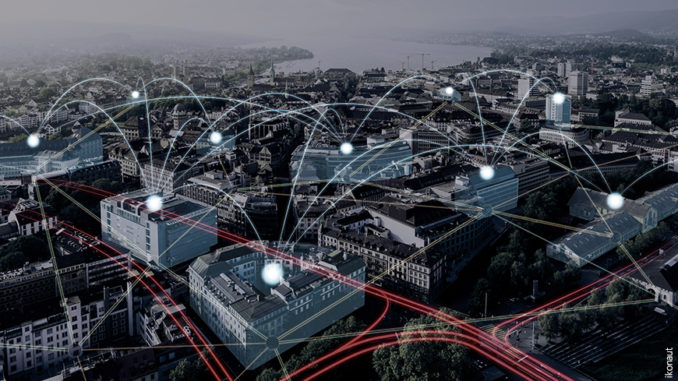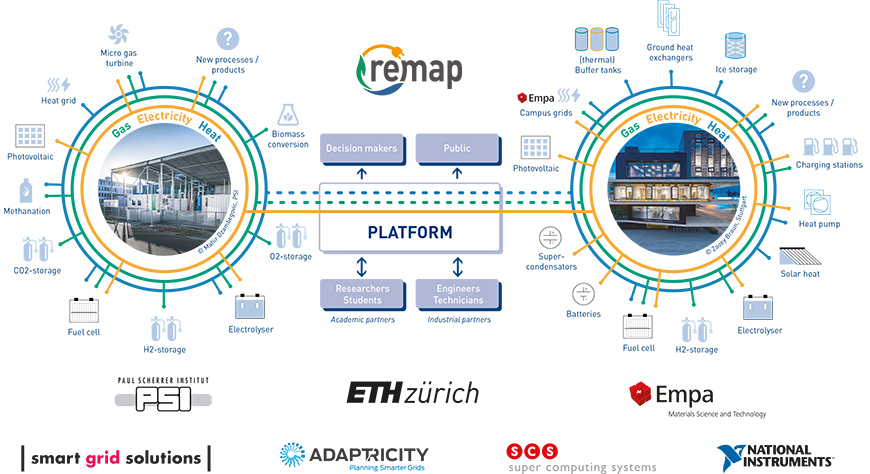
Views: 27
Our energy system is changing: The permanent availability of energy in the right place at the right time is becoming more demanding. At the same time, digitalization offers us new tools for better controlling energy flows. A new joint energy research platform of ETH Zurich, the Paul Scherrer Institute (PSI) and Empa – ReMaP – aims at contributing to a better understanding of interconnected future energy systems.
Courtesy EMPA| STEPHAN KÄLIN : On a sunny summer day what do we do with solar power if it cannot be used directly? Which storage solutions can (and should) be used? When does a conversion into hydrogen – or any other energy carrier, for that matter – make sense, and what does this mean for the grid? The megatrends of today’s energy research are well known: Energy production is becoming increasingly decentralized. Electricity is becoming more and more important – in mobility but also for heating. Digital solutions for measuring and controlling energy flows and the inclusion of Artificial Intelligence (AI) generate new opportunities for reducing energy consumption and for an optimized distribution.
With these trends in mind, energy researchers at ETH Zurich, the Paul Scherrer Institute (PSI) and Empa are working on the design of a future energy system. In the last few years, the energy research platform “ehub”, the mobility demonstrator “move” and the research and innovation building “NEST” have been installed at the Empa campus in Dübendorf. Taken together, these platforms form a living district that allows new technologies to be implemented, operated and validated in a real-world environment. At the same time, PSI in Villigen has created the “Energy System Integration” (ESI) test platform, which also deals with new solutions for storing and converting energy. Led by ETH Zurich’s Energy Science Center, these infrastructures will be integrated in a new research platform, ReMaP (Renewable Management and Real-Time Control Platform), and brought to a new level. A digital model of all facilities will make it possible to simulate the researchers’ ideas before they are actually implemented. ReMaP was launched at the end of 2018 and is now being developed step by step.
Bringing new concepts to the market faster
“By connecting the platforms and combining the research data, we are creating new opportunities for energy research from a systemic perspective,” says Philipp Heer, Head of ehub and responsible for the ReMaP project at Empa. “The actual implementation of innovative approaches on the research platform is intended to help these approaches to be established in the energy market more quickly and without risk”.
Ten research projects are already underway. One of them, for instance, combines the stationary batteries in NEST with the Power-to-Gas system at PSI In order to investigate the optimum interaction of these storage solutions for surplus electricity. Another project is investigating the question of what an individual energy consumer – such as a tenant – considers more important: his privacy or minimizing his energy expenses. Smart meters and storage devices allow insights into consumer behavior, which can be used to optimize the power grid. A team led by ETH Zurich researcher Gabriela Hug has developed a local energy store with a “protection algorithm”. The consumer decides for him-/herself whether he or she wants to optimize energy expenses while at the same time disclosing his/her consumption, or whether he/she wants to protect his/her privacy by having the storage system conceal the energy consumption. This exemplifies how many different levels and interdependencies the transformation of our energy system encompasses and that eventually not only technological solutions but also user acceptance will be crucial. At the end of the day, researchers can only draw conclusions about this “human component” if novel concepts and ideas are implemented in a real-world environment such as the research platforms combined in ReMaP.
ReMaP is supported by the Swiss Federal Office of Energy (SFOE) and the ETH Foundation. ReMaP is open to other universities, research institutes and industry.

Leave a Reply